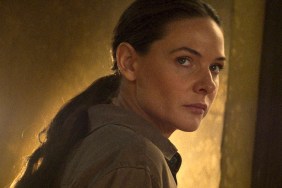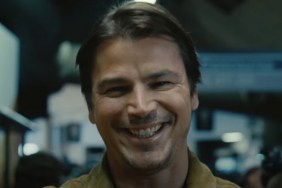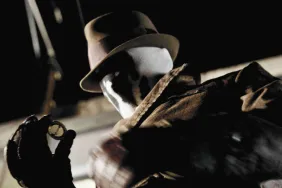The Sundance Film Festival has always been a great showcase for some of the best docs of the year, and though we didn’t have time to see many of them, we knew we couldn’t miss Ondi Timoner’s We Live in Public, an amazing portrait of Joshua Harris, an internet pioneer unlike any other.
Often called the “Warhol of the Web,” Harris approached the coming of the internet like a work of art, being the first to institute much of the technology that is so commonplace nowadays. His company Pseudo.com was one of the first to stream live video, and Harris used the money from that to forge an experiment called “Quiet,” essentially a basement bunker where dozens of New York artists and others lived while being filmed 24 hours a day. Harris followed this with a more personal project where he and his girlfriend Tanya holed themselves up in their loft with surveillance cameras documenting their every move on the website “WeLiveinPublic.com,” which ultimately led to Harris’ mental and financial collapse.
What makes the film amazing, beyond the amount of coverage and footage Timoner had to work with, is how much of what Harris was doing back in the ’90s predates the internet as it is today with social networking sites like MySpace and Facebook allowing people to let the world know what they’re doing at any given moment. The significance of the film and Harris’ work couldn’t be seen any clearer at this year’s festival than by the way art and technology has been combined at Sundance’s New Frontiers on Main, and internet-related pieces like “We Feel Fine” which were foreshadowed by Harris’ experimental work in the bunker and on WeLiveinPublic.com.
Timoner spent seven years following the narcissistic rock band The Dandy Warhols around to film her previous doc Dig!, which won the Jury Prize five years ago, and it wasn’t too surprising that the equally challenging We Live in Public won the Jury Prize itself this past Saturday.
Since the film’s debut on January 19, Timoner and Harris were becoming somewhat of a Sundance power couple due to the buzz surrounding the film, so we were excited to have a chance to sit down with them for a chat and some delicious food at the MySpace Café. The two of them admitted to having been up until 4AM the night before, so the results were more of a wild, freestyle conversation than a traditional interview.
ComingSoon.net: It’s been an exciting week I’m sure, but I’m curious about how this came about. I read that you started doing something back in 2000 about “Quiet,” then put it to bed and then started it up again?
Ondi Timoner: We started filming together in 1999, when Josh invited me to come film the bunker. I made a feature length version of just the bunker and it was much more from the perspective of an artists’ community underground and really about these different installations, and very much more in-depth obviously because it was occupying what 20 or 25 minutes of screening time, it was a feature-length event. I guess for different reasons, we did not release that film. Josh actually liked the cut of the film, still does.
Joshua Harris: I still do.
Timoner: He hasn’t seen “We Live in Public” but he has seen the bunker cut. I think I called it “People Watching” or I called it “The Bubble” and then Soderbergh came along and made “Bubble.” Literally, we had “Bubble LLC” the company and everything and the film was called “The Bubble.” We abandoned the project or put a pause on it long before Soderbergh came along, but thank God we did, because technology and society caught up with this film, and with what Josh was actually saying there in the bunker. If we had put it out then, it would have been an interesting art piece, but it wouldn’t have had the relevance obviously that it does today where MySpace and Facebook are part of our fabric. If you don’t have a BlackBerry, you’re running out and buying one, and the virtual world is taking over, sort of undeniably.
CS: When did you pick it up again?
Timoner: He was gone for a couple of years. I didn’t film him.
Harris: We picked it up because one day I pick up the New York Times and she won with “Dig!”… I said it.
Timoner: When “Dig!” won the Grand Jury prize, my picture was on Page 2 of the New York Times…
Harris: A nice picture, too… I thought it was a good shot.
Timoner: Thank you, postpartum I looked a little different. Anyway, Josh contacted me and asked if I’d be interested in coming back and completing the film, and I said “no.”
Harris: Glee in her “no” as well.
Timoner: Yeah, there was a little glee, ’cause things didn’t really end cleanly with us in 2001 when we abandoned the project. The Dot.com had crashed…
Harris: We’re going forward in the chronology.
Timoner: Yeah, and I still didn’t know what the film was about. I thought, you know what? It’s interesting footage, amazing guy who created… All I knew and what I thought of Josh Harris was I don’t know if he’s a visionary or a buffoon. I don’t know if he’s a Dot.com millionaire buying his way into the art world, as many people said he was. I didn’t know until 2006 when my friends were posting their lives online and I started to connect all the dots. I started realizing what I’d been filming, that it was a physical metaphor for where we were all headed with life online.

CS: I wanted to ask about this “art” thing. It’s interesting to me to think of someone who’s essentially a programmer but whom also considers themselves an artist at the same time; it seems like two different ways of thinking. Is it just that you had these two things always floating around your head?
Harris: I had one thing going on in my head, and the other was a means to an end. That was the preparation to actually have the money to make the art.
CS: Before you started doing these big parties, had you been doing art on the side?
Harris: Yeah, I would say starting in 1994–I had a little before then, I had been kind of warming up–but in 1994 I left Jupiter Communications, started Pseudo Programs Inc. and basically took an empty 10,000 Square Loft on Broadway and Houston in Manhattan and that was the beginning of my art. It didn’t mean that my business and commerce ceased, but that’s when I came out.
Timoner: I feel like that’s absolutely crucial to making art… not absolutely crucial, but if you’re not lucky enough to land as an artist in the hands of a patron who understands you, you have to finance your own work and/or figure out the way to get the financing to do what you’re going to do because art takes money, so I feel as a filmmaker, thank God my Dad was an entrepeneur and I have a business sense and I’m able to figure out what to do with my films and how to strategically place them. I would feel just so grateful that I have a producer side to me as well as a director’s side, but they’re totally different sides of my brain.
CS: When you deal with programmers, you’d never really assume that any of them would be able to think in a more artistically creative way. So anyway, you had all the footage from “Quiet”…
Timoner: I had recorded it. Josh is a wonderful… because he is an artist, he has a sense of what an artist needs, and even when he was a big man with a credit card, he knew what we would need or he’d listen to our needs. He said, “Do you want to document cultural history?” and I said, “What do you have in mind?” and as usual, he wouldn’t tell me anything or articulate anything because he likes to watch me figure things out. He said, “Why don’t you show up in Manhattan and tell me what you think you need?” So I showed up and I saw that he was creating this bunker and I said, “I think we can do it with five roaming digital video cameras and then you have 110 surveillance cameras that are part of your whole massive plan, so let’s get a multiplex.” That box scene with the nine squares? Some of that we’ve recreated but that’s actually what we did. That’s how we recorded “Quiet” so that we could see and monitor all the different spaces and choose where the action is happening, and then on walkie-talkie, I would send my crew to those places.
CS: Was all of that footage sitting in storage somewhere?
Harris: It was mobile over the years.
Timoner: First I cut a piece, we abandoned the project, I flew to Africa and really washed my hands of him and the project. He went on to do WeLiveinPublic.com and then he recorded himself, God bless him. That was nuts because he recorded that all on extended long play VHS from every camera, so we got those boxes this summer. We only got them this summer, literally 2008, June maybe. Because he believes they’re all collector’s items, those VHS tapes, we’d have to go through box by box and finish the box and send it back to Iron Mountain in New York just to get one more box back.
Harris: Just to be safe…
Timoner: At a certain point, he realized I think… he believed me, that I was very serious about finishing this film and he let me have two boxes at a time.
Harris: We went to three!
Timoner: Okay, at a certain point, I was like, “If you really want me to find any of this content, I need the boxes now. It’s October 2008 and we need these boxes.” A woman named Sandra Validieos, amazing woman, came on as an intern. I ended up paying her eventually because she was there 24-7 basically curating this footage, looking through it, and pulling selects off these VHS tapes. I told her what to look for. From when I figured out what the film was about, I had never questioned, I had never been so clear about a film in my life, and thank God, because it’s such a complicated film that if somehow that lightning bolt hadn’t struck, I don’t think we’d be here right now, because there was no time really to mess around. We really started editing this film that you saw in April. 5,000 hours of footage. You know what it is? We had a great team at Interloper, amazing kids. Everybody shares my passion and everybody shared the belief that this film had to happen right now, so they all just went for it.
CS: You mentioned that you haven’t seen this movie yet. Do you have any intention of seeing the movie?
Harris: No rush. I knew the material, but how she edited it, that’s her point of view. I just don’t want to (see it).
CS: So you just wanted to give her the freedom to make the movie she wanted to make however she wanted?
Harris: That’s what I did. Otherwise, why am I working with her?
Timoner: You know what? He’s the only documentary subject I’ve ever had that’s said to me, “I don’t care how I look in this film as long as you make a great film.”
Harris: There’s no other way to do it, or otherwise, why am I dealing with her if I don’t have faith she’s going to make a piece of art.

CS: You haven’t been tempted to see it with an audience here just to see how it turned out?
Harris: You know, my favorite thing, we do the Q ‘n’ As. We went to Salt Lake City and it wasn’t an industry audience, it was just people, so we walked in because the film was over, and it was obvious that they really liked the work, and that’s good to know. I trust them.
CS: Knowing the history of this project and your previous film “Dig!,” it would seem like you were working on both movies at the same time.
Timoner: I was doing “Dig!” at the same time. I think you’re the first journalist to ask that question. I expected everybody to be like, “How did that happen?” I was filming “Dig!” fully at that time. I had actually met David LaChapelle through a Dandy Warhols video and I hit it off with him and decided to document him, so I came to New York to film him for a project called “Artists and Prostitutes” that I have yet to complete. I went down to Pseudo to pick up some extra cash, and I was also financing “Dig!” at the time, so I was quite used to doing music videos or short-term projects or “Cherry Bomb” on Pseudo, whatever it was to finance my various projects including “Dig!’ And then “Dig!” looks like I was filming with them every second of every day but that’s what happens when you shoot something over seven years or ten years, it looks like you’re there all the time. That was part of the trick of “Dig!” but actually, I had time to go and film Josh, too. In fact, we had Courtney Taylor from the Dandies…
Harris: Did he make the cut?
Timoner: No, he didn’t. I cut him at the last minute. He swung by the bunker to visit, to say “Hi” and to meet Josh, it overlapped. It’ll be on the DVD.
CS: So people were actually able to come in and out of the bunker? I got the impression that people just went in and no one came in or out?
Timoner: People could visit, but if you’re a citizen, you weren’t supposed to leave.
Harris: Actually, you could leave, but it was discouraged.
Timoner: You’re not supposed to. If you were running an event, you sometimes had to leave, like you had to get tinfoil like that dining room table covered in tin foil. I have this great scene that didn’t make the cut–there’s a lot that didn’t make the cut obviously–but I have this great scene with the artist Owen Bush, where he goes to get the tinfoil for the 80-foot long dining room table… at the deli next door, and he walks out of the place, and they have no idea what’s going on across the street. It’s like stepping out into another world.
CS: I wanted to ask about that, because you’d think that with something like that going on in New York, and 1999 is a very different time than now…
Timoner: It’s about a hundred years ago.
CS: Yeah, it seems like that, but how was this going on without the police knowing about it?
Harris: I was very fluent in the game. I was working it.
Timoner: Remember what he says in the movie? “I’m in touch with Guiliani’s security force. They will not bust me before my time.” He goes, “I don’t believe they will bust me before my time.”
CS: That’s amazing because Guiliani was busting EVERYONE around that time, closing up the sex shops, etc.
Harris: Well, I can give you the game plan of how I fended them off. They tried to bust me, and they gave me a fire violation, which is spurious, so I called up the Times and they ran it, and the guys who came into Pseudo to give me the violation were part of the New York Social Club Taskforce, so I got in the Times, then I had the Pseudo attorneys looking into the documentation of how they were funding the Social Club Task Force. I got a hold of the documentation and it was a very loose document to say the least, and I made it clear I had the documentation. They were very careful about everything.
CS: It’s interesting how this movie shows how times have changed in some ways. When this was going on, it was before 9/11, and it’s strange that security has cracked down since then, while in real life, everyone is going online and sharing everything about themselves. It’s a strange dichotomy, and I wondered if you realized that while making the movie.
Timoner: That’s really interesting! That’s an amazing insight. You’re saying that in the physical world, we’ve had clampdown, and in the virtual world, everything is free. Maybe that’s helping propel people online. I think Josh would argue it’s inevitable at happening anyway, but maybe the speed at which people have… I mean, Josh’s vision has come true in less than a decade. He actually envisioned this long before the bunker, but he created the bunker to prove out his theory. “No matter what I said as people came streaming in; it doesn’t matter how totalitarian and insane I make this, they don’t even know what they’re getting into and they don’t care.” They know that the cameras are there, they know their lives are made to matter, they’re going to show up. But you’re right. That’s very interesting. The bunker could never happen (now).
Harris: You’ve got a couple days before she starts using it in the next interview. You have like a two-day window.
Timoner: Yeah, 24 hours. Geoff Gilmore was saying to me before Sundance, he was raving about the film and Sundance was so unanimously supportive of this film before the festival, and he was saying to me, “I just hope that everybody gets all the layers.” Clearly, I don’t get all the layers; I thought I had them all, but you just pointed out another one. I think it’s a cool take on it, but you know what? I think it would have happened anyway. Everything’s free online except your image. “That we own.” I mean, he called it, but that’s the perception and that’s what the film’s central point is. It’s “Beware.” Enjoy it. Yes, it connects people in space and time, and it’s undeniable reality, we’re not judging it, but just are you looking down at your BlackBerry or are you looking up at the world around you? You make that choice… and don’t get rid of your BlackBerry! The internet’s amazing. Technology is incredible. Without it, we wouldn’t have made this movie. We made the movie online.
CS: Has anyone who participated in “Quiet” heard about the movie or been curious to see it?
Timoner: Can you imagine in New York City, the theatrical of this film. People walking by on dates with their people like ten years later and looking at the (poster) and saying “Oh, no.”?
Harris: “My kids are in the movie!”

(At this point, Harris starts asking Timoner about whether certain scenes got into the movie and they go back and forth about some of the specific people they’re worried might see the film.)
CS: Have either of you had contact with any of the people from “Quiet”?
Timoner: Yeah, they were all contemplating coming to Sundance. Michael Portnoy was here – of the shower fame. I asked him if he’d like to do a performance at our party, and he actually said, “I’ve moved on. I’m past public display in that way, but I’d love to see the movie.” He loved the film. He thought it was about so much more.
(At this point, we all go off on a tangent talking about the “New Frontiers at Main” exhibition and some of the cool things there that relate to Josh’s work and the film.)
Timoner: (Josh) knew exactly how we’d react to this technology in the late ’80s when you and I had no idea what an internet is. And now, if we cut off your internet, we’d have serious issues.
Harris: Revolution.
Timoner: It may be awesome, if the internet went down for a month.
CS: I think New York would be reverted back to caveman times and people would be…
Timoner: Freaking out.
CS: By the way, do you think there’s any chance of a “Quiet” reunion or if you’ve thought of getting everyone from the bunker back together again for something else?
Timoner: I think there might be one when this movie premieres in New York… and I may be running.
Harris: It’s okay, I’ll make sure that (NAME REMOVED) knows exactly where you are.
Timoner: Thanks… so I can shoot the sequel ineffectively? You don’t want me off the planet. I’m like your personal Leni Reifenstein.
Harris: Yeah… well, thanks. (laughs)
Timoner: You know that he used to call me that? No, you know who used to call me that? David LaChappelle. Literally said I reminded him of… she’s not a bad woman. That’s why it’s an amazing metaphor. By the way, we have not said that ever yet, so you can use it this one time and then we’ll bury it; we won’t use it again.
(At this point, the two of them start riffing on this bit and the interviewer starts wondering how on earth he’s going to transcribe any of this.)
CS: One of the other things I got out of “Quiet” is that it seemed to foreshadow the advent of reality TV and shows like “Big Brother.”
Harris: Even now, reality TV is inefficient to me. The problem is that there’s only eight people that are real and there are millions watching that reality. People want to be involved in the reality. Why should they watch somebody else?
CS: Have you thought of any other ideas you’ve wanted to do since your last project?
Harris: I laid it all on the table when I left New York, but I’ve been working on new material. I don’t want to keep doing the same thing over and over. That’s what you’re supposed to do in the art game. Watch Schnabel’s movie “Basquiat”; he lays out the instructions.
CS: Have you been back to New York since you left and might you go there if the film plays at one of the festivals or premieres there?
Harris: Oh, yeah, are you kidding me?
CS: Really? I got the impression from the movie that you’ve been in hiding.
Harris: Well, yeah, yeah, I have been…
Timoner: He’s been waiting for the masterplan. We were in Ethipia and someone said to him, my cameraman asked you, “What’s your plan?” And he went, “This, this is my plan.” Then he said, “What’s Plan B?” and he said, “Plan A hasn’t failed yet, why would I come up with a Plan B?”
Harris: I haven’t gone to Plan B yet. No need to.
CS: So do you think you’ll go back?
Harris: Well, New York will unfold when New York unfolds. I got kicked out of New York though, for all kinds of reasons, and the law in New York says if you’re kicked out, you’re welcome to visit but you can’t stay. New York is still New York. There’s certain unwritten laws. I’m glad I left because…
Timoner: You left at your own volition as well. You had a nervous breakdown and left.
Harris: Well, no… yeah, but the thing is that for whatever reason, it’s not a good place to be if you’re not supposed to be there.
Timoner: I would argue, just as a lowly little filmmaker, my philosophy in life is that you’ve gotta know the rules so that you can know exactly when and how to break them. And Josh might actually find that New York is very hospitable and welcoming of him.
Harris: Maybe, but you kind of know… You want to know one thing? You know the one thing I’m most curious about is when people thought I started getting stupider. Did all of a sudden I get to be an idiot?
Timoner: No, they didn’t think you were smart in the beginning. Now they know how smart you are. That’s what I think.
Harris: You’re talking Pseudo, not Jupiter.
Timoner: I wasn’t even talking about Pseudo, I was totally talking about the bunker and the perception of him as a businessman trying to buy his way into the art world. Nobody really thought he had a vision and everybody thought Pseudo was extremely wasteful.
(And at this point, the two of them get into an argument about this…)
CS: (Trying to restore order) But even what you were doing with Pseudo was ahead of its time, since everyone is doing that now, having streaming video with different channels.
Timoner: He called it… but there was no broadband. It wasn’t as important to him to have a solid business. He knew from Jupiter Communications that there wouldn’t be broadband.
Harris: I understood the marketplace.
Timoner: He understood it, but he knew he was going to be the first anyway. He was still going to lay it down and say, “Here’s where it’s all going.”
CS: I think what’s important about the movie is that it reminds people of what Josh did back in the ’90s.
Harris: I think in the last four or five years, it’s gone solidly mainstream, there’s no doubt about that.
CS: Do you see a way to bring the art back into the internet?
Harris: Yeah, I’m working on new material.
Timoner: It’s bizarre that it’s the art of the internet.
Harris: It takes a long time to get your material together. Can you do one thing for me? Now I want to do a commercial piece in large scale, and in particular, I’d like to go up and work with Microsoft. Can you make note of that in some significant way? If you wouldn’t mind.
Well, we don’t know if Bill Gates reads ComingSoon.net or if he’d read this interview, but if so, now he knows! We ended the “interview” with a lengthy conversation about how the movie might play in New York City, lots of picture taking and things ending as abruptly as did some of Harris’ experimental ventures.
We Live in Public is still seeking distribution, but with its recent Jury Prize win, one can expect that to happen shortly.









